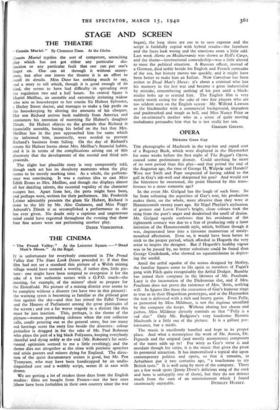OPERA
Dickens Goes Gay
THE photographs of Macheath in the top-hat and caped coat of a Regency Buck, which were displayed in the Haymarket for some weeks before the first night of The Beggar's Opera, caused some preliminary dismay. Could anything be more of its own period than this play—and that period the end of the Augustan age, the time of George II, Walpole and Handel? Were not Swift and Pope suspected of having added to the gall in Gay's ink-well and sharpened his pen? And would not the bitterness be sweetened, the point blunted by this trans- ference to a more romantic age?
In the event Mr. Gielgud has the laugh of such fears. So far from softening the asperities of Gay's text, his production makes them, on the whole, more abrasive than they were at Hammersmith twenty years ago. Sir Nigel Playfair's stylisation of gesture and Lovat Fraser's bright, clean colours took the sting from the poet's anger and deodorised the smell of drains. Mr. Gielgud openly confesses that his avoidance of the eighteenth century was due to a fear of producing only a lame imitation of the Hammersmith style, which, brilliant though it was, degenerated later into a tiresome mannerism of mealy- mouthed affectation. Even so, it would have been better to stick to the proper period, which afforded in Hogarth the very artist to inspire the designer. But if Hogarth's healthy vigour was to be passed by, no better substitute could be found than George Cruikshank, who showed no squeamishness in depict- ing the sordid.
Amid the artful squalor of the scenes designed by Motley, the familiar figures come to life again as members of Fagin's gang with Filch quite recognisably the Artful Dodger. Bumble has joined their company in the likeness of Mr. Peachum. Lucy is the incarnation of the Dickensian slut, and if Mrs. Peachum does not prove the existence of Mrs. 'Arris, nothing will. In figures like these the coarseness of Gay's humour rings as true as in their Hogarthian prototypes, and at the Haymarket the text is delivered with a rich and hearty gusto. Even Polly, as presented by Miss Mildmay, is not the ingenue unsullied by the company she keeps. Without abating her charm and pathos, Miss Mildmay cleverly reminds us that " Polly is a sad slut." Only Mr. Redgrave's very handsome Byronic Macheath is a little out of the picture. It is a gallant per- formance, but a misfit.
The music is excellently handled and kept in its proper place. And what a masterpiece the work of Mr. Austin, Dr. Pepusch and the original (and mostly anonymous) composers of the tunes adds up to! For witty as Gay's verse is and mordant though his satire, it is the music that gives the piece its perennial attraction. It has immortalised a topical skit upon contemporary politics and opera, so that it remains, as Arbuthnot put it two centuries ago, " a touchstone to try British taste." It is well sung by most of the company. There are a few weak spots (Jenny Diver's delicious song of the cock and hens is unhappily one of them), but they do not detract much from the sum of an entertainment which I found






















































 Previous page
Previous page